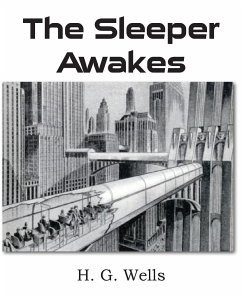Trying to cure his insomnia, Londoner Graham falls into a drug-induced coma in 1897… and wakes up 203 years later. He discovers a world in turmoil, a world shocked at his awakening, a world… that he owns. Thus begins H.G. Wells' classic tale of a man out of time. Thrust into this new world, Graham becomes a symbol both for those who want to keep him as a figure head to maintain the status quo, and the rebels who want him to overthrow the government. While dealing with these political factions, Graham also tours the world of the future, showing us the wonders and horrors Wells imagined. Violent struggle, however, will be the outcome, with the very future hanging in the balance. Wells originally published When the Sleeper Wakes in 1899, but a decade later, he called it "one of the most ambitious and least satisfactory of my books." He took "the opportunity afforded by [the 1910] reprinting to make a number of excisions and alterations," which resulted in this much more satisfactory book, The Sleeper Awakes. British author Herbert George Wells (1866-1946) was at home in many genres, including history, politics, and social commentary, as well as the fiction for which he is best remembered today. He was one of the fathers of modern science fiction, and was nominated for the Nobel Prize in Literature four times (in 1921, 1932, 1935, and 1946). He is the author of such enduring classics as The Time Machine (1895), The Island of Doctor Moreau (1896), The Invisible Man (1897), and The War of the Worlds (1898). His career continued through his last novel, You Can't Be Too Careful (1941). Simultaneously, his non-fiction career ran from a Text-Book of Biology (1893), through a discussion of Marxism vs Liberalism (1945).
Hinweis: Dieser Artikel kann nur an eine deutsche Lieferadresse ausgeliefert werden.
Hinweis: Dieser Artikel kann nur an eine deutsche Lieferadresse ausgeliefert werden.








